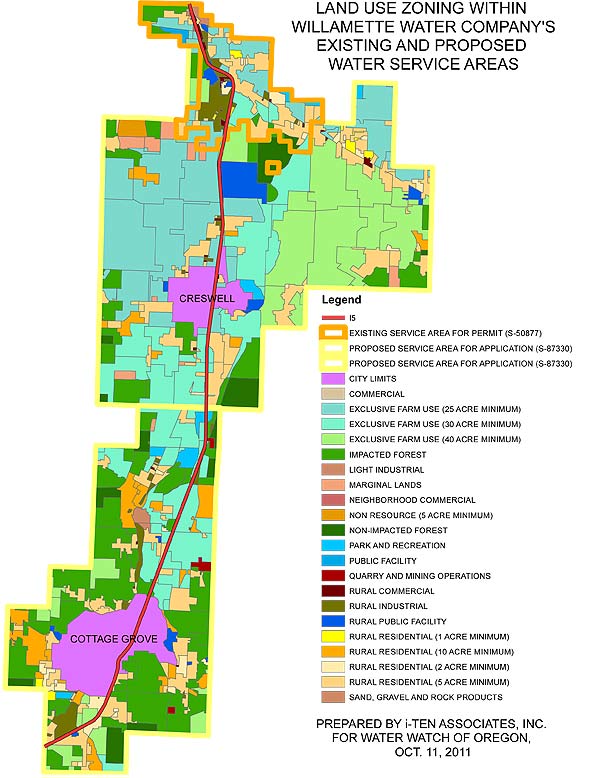
Water Rights, Water Wrongs
A private water company seeks to control public water
Should a private water company get the right to 22 million gallons a day of water out of the McKenzie River, the same river that supplies the people Eugene with all of their water? That’s a question at the heart of a contested case hearing that starts Nov. 14 before the Office of Administrative Hearings for the Oregon Water Resources Department (WRD).
Willamette Water Company (WWC) is a small “quasi-municipal” water provider that supplies water to about 100 residential customers and 60 or so businesses and industries in Goshen, according to documents from the Oregon Public Utilities Commission. WWC has a water right of 4 cubic feet per second (cfs) right now, but it has applied for a second water right for an additional 34 cfs of water out of the McKenzie. A quasi-municipal water source can supply water to a community, but it is privately owned.
The McKenzie River is rare in the West because not all of its water rights have been taken up. But water, always in demand, is becoming a hotter commodity as climate change starts to dry up the West’s already contested water supply. Speculating on water the way investors do on other commodities is technically illegal, but experts say the water rights system, which assumes water needs to be used, is flawed and doesn’t protect the water supply or the ecosystems that depend on it. Whoever gets the water right first has claim to the water, and in general they must “use it or lose it.”
“There just is not substantial evidence to support a finding that the 34 cfs amount is needed or could be beneficially used,” says attorney Lisa Brown of WaterWatch of Oregon. WaterWatch is a protestant in the hearing, which is scheduled to last for three days.
WWC hired EGR and Associates of Eugene to do a water demand analysis to refute WaterWatch’s claim. According to EGR, “rural residential users, industrial and commercial users, and emergency water supply use by the Creswell and Cottage Grove municipalities” would take almost 43 cfs to supply a total 40-year water demand projection for what it calls the “WWC service area.”
The company used the water demand of an industrial park at the Port of Morrow, near Boardman, in its analysis to show how much water industrial and commercial users might need. It also solicited letters from Cottage Grove and Creswell in an effort to prove those cities need the water it would supply. But Brown says though Willamette Water might claim it needs the water so it can be a back-up supply to the cities of Cottage Grove and Creswell, “neither city has made any agreement with the company to use the water now or in the future.”
As for the comparison to the industrial park, she says, “The company’s projections assume that these rural lands would become as industrialized as the Port of Morrow. That is just not reasonable.” The Port of Morrow, which WWC uses for comparison, is close to a power plant as well as a shipping port. Goshen is not.
It appears the water right issue is as much a land issue as it is about who needs or wants the McKenzie’s pristine water.
Though WWC has been around since the 1980s, it was purchased by Greg Demers in August 2006. According to a December 2009 Water Utility Annual Report, the corporation has two stockholders — Demers and Melvin McDougal. Greg Demers is listed as the company’s president, and Jeff Demers as the director of operations. WWC has shared administration, offices and other goods and services with Frontier Resources LLC, which Oregon’s Corporation Division says is made up of Greg and Jeff Demers, as well as Ed King of King Estate Winery. The McDougals and Demers own thousands of acres of land around Lane County.
Currently, WWC supplies Goshen with its water. Commissioner Faye Stewart has been pushing to have Goshen, a small community one exit south of Eugene off I-5, rezoned from rural industrial land (home to things like logging mills) to urban industrial. Last February the Lane County commissioners directed the Land Management Division to initiate a process to seek an exception to Oregon statewide planning requirements, to allow “an urban level of employment uses” to develop within Goshen. Presentations at public hearings have featured images of industrial parks, and maps show Goshen as changing from a largely rural area to an industrial corridor. There will be an open house on the proposed Goshen changes on Nov. 16. The Lane County commissioners voted 3-2 on Oct. 26, with commissioners Sid Leiken, Jay Bozievich and Stewart in favor, to support WWC’s pursuit of a larger water right.
The upcoming contested case hearing is not the only one Willamette Water faces in its push to claim water from the McKenzie River. The Oregon Department of Fish and Wildlife has recommended that if WWC gets a permit, then it should have a bypass requirement added to that requires 2,000 cfs of water to be flowing down the river past the point where the company would intake the water in order to protect habitat for endangered species like threatened Oregon chub. WWC is fighting that requirement.
WaterWatch has submitted EW’s 2010 series on the McKenzie River and Willamette Water Co. as an exhibit in the contested case hearing. To read the series go to http://wkly.ws/14t

|
|
|
|
|||||
|
|
|||||||
|
|
|
|
|||||
|
|
|||||||
|
|
Table of Contents | News | Views | Blogs | Calendar | Film | Music | Culture | Classifieds | Personals |
|
|||||
|
|
|||||||